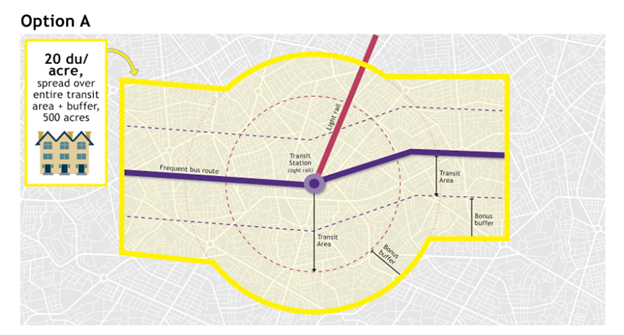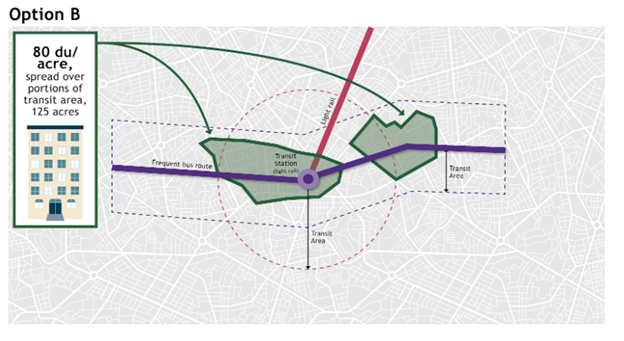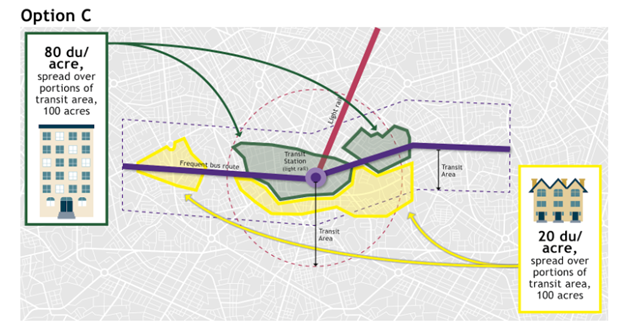Last year, the Colorado legislature passed House Bill 24-1313 (the “Act”), which aimed to incentivize transit-oriented development in certain Front Range jurisdictions that qualify as Transit-Oriented Communities (“TOC(s)”). The Act requires qualifying jurisdictions to permit density around transit corridors. To incentivize these changes, the Act also included $35 million to fund a related grant program for related infrastructure upgrades, including on-site infrastructure for affordable housing and public infrastructure projects to benefit transit centers and affordable housing, and other similar projects. Non-qualifying jurisdictions may also opt-in to this program by authorizing in transit-oriented development under separate guidance from the Colorado Department of Local Affairs (“DOLA”).
The Act requires TOCs to designate “Transit Centers” near rail and bus lines and to adopt local zoning codes to permit more housing density in those areas. First, a TOC must identify a housing opportunity goal. A housing opportunity goal does not establish a target number of new housing units that will necessarily be built, but instead sets a zoning capacity goal—a target number of housing units that a local jurisdiction’s zoning code will permit in a Transit Center after TOCs update their zoning codes. A TOC’s determines its housing opportunity goal using the formula established in the Act, which provides a TOC’s housing opportunity goal is the total acreage of eligible parcels in state-identified “Transit Areas” within its jurisdiction multiplied by 40 units.
Notably, while the Act provides a formula for TOCs to set their housing opportunity goals, the Act also provides jurisdictions with some flexibility to identify Transit Centers (distinct from Transit Areas), subject to certain requirements under the Act. TOCs may amend their zoning codes to meet the housing opportunity goals across the area identified as a Transit Center, not just within the state-identified Transit Area. DOLA has created several visuals explaining the flexible approaches jurisdictions have in determining how to meet their housing opportunity goals:


See here for a detailed explanation of the Act. DOLA also recently developed detailed guidance for local jurisdictions, linked here.
The pushback and the enforcement
During the 2024 legislative session, the Colorado legislature passed six bills aimed at addressing housing shortages and other development challenges. According to CPR News, some local jurisdictions are now voicing concerns, and, in some cases, suggesting that they may consider legal action to challenge some of these the laws, including the Act. The most vocal jurisdictions in opposition to the Act are worried (1) that there is not enough demand or infrastructure to support the density required under the Act and, (2) more broadly, about the loss of local control.
Questions remain about what happens next if local leaders do not formally challenge the law but also do not meet its requirements. Initially, the Act contained language authorizing the State to withhold highway maintenance funds from TOCs that did not update their zoning codes to permit the required number of housing units in connection with their housing opportunity goals. However, that penalty was stripped out of the bill before its passage following pushback from local governments.
Instead, the Act creates an incentive for TOCs—a grant program with $35 million in funds dedicated to support local governments in upgrading infrastructure to facilitate increased transit-oriented development. If the promise of grant funding is not enough to convince TOCs to update their zoning codes in compliance with the law, other enforcement mechanisms may be available to the State. While Colorado’s Attorney General is not explicitly authorized to independently bring an action to enforce this statute, Colorado Revised Statute § 24-31-101(1)(h) requires the Attorney General to prosecute particular suits at the request of the Governor.
If a TOC brought a legal challenge against implementation of the law or if the Governor requested the Attorney General bring an enforcement action against a non-compliant TOC, courts would likely consider whether the Act can preempt a local zoning ordinance – a common inquiry when state-level legislation dictates local governments behavior.
Are housing policies a matter of local, mixed-state-and-local, or state concern?
In Colorado, local governments have historically had great discretion in adopting their own local land use controls. This is particularly true for home rule jurisdictions, which make up many of the jurisdictions pushing back on the Act. Unlike statutory jurisdictions, which only have the authority granted to them by the state, home rule jurisdictions have the power to adopt ordinances that conflict with state statute, in some circumstances. However, such conflicting ordinances may be preempted by state statute, depending on whether the local ordinance involves a matter of statewide concern, local concern, or mixed state and local concern. Where an issue is a matter of statewide concern or mixed state and local concern, the state law will trump the local ordinance, and, similarly, where an issue is a matter of purely local concern, the local ordinance will supersede state law.
Accordingly, jurisdictions often frame their responses to state-required zoning changes such as those required under the Act as matters of local concern. For example, in November 2024, in response to another state law requiring changes to zoning codes, Northglenn passed a declaration announcing the City’s intent “to zealously assert its home rule authority to enact local zoning and subdivision regulations which supersede and preempt State legislation regulating zoning and subdivision matters as matters of purely local concern . . . .” City of Northglenn, City Council Ordinance CB-2024, Unified Development Ordinance Amendment – Housing Occupancy Limits.
Meanwhile, the Act itself describes affordable housing as a matter of mixed statewide and local concern. See C.R.S. § 29-35-201(2)(c). For a more detailed analysis of the possibility of state law preempting a local zoning ordinance, please review our past alert on this topic.
Conclusion
There continues to be a great need for additional housing across Colorado. The broader context for such development involves a high-cost construction market and increasing uncertainty about interest rates, the impact of potential tariffs on building material costs, and possible labor shortages. We would encourage local municipalities to think creatively about how to leverage the opportunities and the flexibility this Act provides to address Colorado’s housing shortage and the resources provided by DOLA for implementation. We would also encourage state and local leaders to attempt to avoid a protracted legal battle and, instead, work together to resolve the challenges of implementing the Act (among them, the demands on staff time and resources to overhaul zoning codes). We believe such collaboration could avoid adding more uncertainty to Colorado’s housing market that could disincentivize or delay the production of much-needed additional housing and undermine the Act’s ambitious and laudable goals of improving transit infrastructure and increasing housing availability.